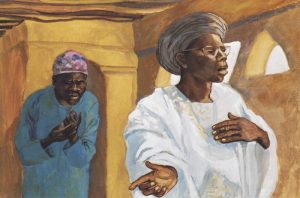Rachael writes: I saw the image below online in the week. Yellow and black like a hazard warning sign for nuclear waste, at the top a big fish with its mouth open is chasing after little fish. Underneath them it says “Do not panic”. Below that, the picture is of the big fish now facing the other direction and all the little fish have arranged themselves to look like an even bigger fish that almost has its mouth around the original big fish. Underneath that it reads “organise”. “Do not panic – organise”.
Our story from Jesus this morning (in Luke 18.9-14), of a Pharisee and a tax collector, is just the next part of the same speech that last week’s story of the unjust judge and the persistent woman came from. Jesus offers both in answer to a question from the real-life Pharisees about when the Kingdom of God would be coming.
Initially Jesus responds to them by saying “the Kingdom of God is among you”. Then he offers the story of justice and faith: of a woman who perseveres and of God who respects and deeply cares for people. And he follows that up with another dichotomy between two opposing characters. This is what the Kingdom of God is like, Jesus says: a Pharisee and a tax collector.

If you had to describe the Pharisee in one word, you might choose “arrogant”. And if asked to do the same for the tax collector, “humble” may well be the word that comes to mind. It comes from the most common Christian interpretation of this passage which many of us will have heard before. However, if we go down the road of Pharisee equals judgemental and bad, and tax collector equals humble and good, as we denounce one character and celebrate the other we find ourselves engaging in the very behaviour that we’re saying the parable condemns. Is there an alternative?
Well first, let’s re-cast the actors based on what we know of historical Jewish culture and religious practice. The Pharisee, amongst first century Jews, would have symbolised a beloved teacher, a pillar of the community, someone deeply admired. The tax-collector, on the other hand, represents a wealthy bootlicker of the 1% and co-conspirator with the occupying enemy.
While the Pharisee is often read as being someone who is taking pride in his own efforts, his first words point to a humble awareness of his need of God. “God, I thank you” he says. We seem to assume that they are empty words but what if this is genuine gratitude and praise for the way his life has turned out and for God’s provision for his ministry? The Pharisee goes above and beyond the law which requires him to fast only on certain feasts (not twice a week as Jesus says he does) and to tithe from the proceeds of his agricultural income (rather than from everything he earns). Both his fasting and his tithing would have been about helping his community which was subject to a brutal occupation. He was contributing to their financial assistance and pleading (like our woman before the judge) for God’s mercy on the Jewish people. His proclamation can be read as self-aggrandisement with a side of contempt for others, or it can be considered heartfelt gratitude and a declaration of reliance on God. Something more like “for there but by the grace of God go I”.
And what about our tax collector? Christ’s Jewish hearers may have eagerly anticipated a wonderful story of redemption where the tax collector engaged in the teshuva or “atonement” rituals and turned his life around, after all, a story of someone who has wronged you being sorry and doing their penance can be deeply cathartic. To have completed these familiar rituals properly the tax collector would have had to admit the harm that he had done, apologise, done all that he could to repair that harm, felt and expressed sincere regret, vowed not to do the same again, and offered a sacrifice in the Temple as a public and religious acknowledgement of his wrong doing. Even then the process of atonement would only be complete when he had opportunity to do the wrong again but chose not to. We don’t get any of that. Just a meagre request for mercy before he trots off home with no word of whether he is going to leave behind his lucrative profession. The listeners may well have been troubled that Christ declared him justified after so little evidence of repentance.
So where does a new understanding of the characters leave us in understanding what Jesus was trying to say with the parable? Well, it all turns on one four letter Greek word: “para”. In our bibles it is translated as “rather than”. But it also means “with”, “alongside”, and “because of”. The tax collector was justified with the Pharisee. The tax collector was justified because of the Pharisee.

Remember this is a parable about the Kingdom of God. Despite all the things that might divide or separate them, or what his listeners might think of them, I believe that Jesus is saying they are both part of it. All through the gospels we see Christ invite disparate people: pharisee and tax collector, fisherman and zealot, prostitute and centurion, to be part of the Kingdom community. He reminds us that we are interconnected and interdependent because God made us so. Christ calls us to remember that. To re-member it. To, by God’s help, put it back together.
It means that when we’re faced with the scary and anxiety inducing things happening in our world, our country, and our community: we do not panic, we organise. And together, as a Kingdom community, we seek a Kingdom kind of justice. “When is the Kingdom of God coming?” the Pharisees asked. “The Kingdom of God is among you”, Jesus replied. In justice and community. Amen, may it be so.
O God, in your mercy: grant your people humility and gratitude, that, inspired by your love and strengthened by your Spirit, they may live and work to spread your justice and deepen community, as a sign of your Kingdom; through Jesus Christ, our Lord, who lives and reigns with you, in the unity of the Holy Spirit, one God, world without end. Amen.






